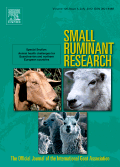
SMALL RUMINANT RESEARCH
Scope & Guideline
Fostering excellence in animal science research.
Introduction
Aims and Scopes
- Genetic Diversity and Breeding:
Research on the genetic diversity, breeding programs, and genetic markers associated with desirable traits in small ruminants. This includes studies on polymorphisms in specific genes and their correlation with growth, reproductive performance, and disease resistance. - Nutrition and Feed Efficiency:
Investigations into the nutritional requirements and feed efficiency of small ruminants, including the effects of different feed types, supplements, and feeding strategies on growth performance, health, and meat quality. - Health and Disease Management:
Studies focused on the health challenges faced by small ruminants, including infectious diseases, metabolic disorders, and the efficacy of vaccines and treatments to improve animal welfare and productivity. - Reproductive Physiology:
Research examining the reproductive physiology of small ruminants, including estrus synchronization, fertility treatments, and the impact of environmental factors on reproductive traits. - Sustainable Production Systems:
Exploration of sustainable management practices for small ruminants, including pasture management, integrated crop-livestock systems, and the socio-economic aspects of small ruminant production. - Behavior and Welfare:
Studies on the behavioral responses of small ruminants to various management practices and environmental conditions, aiming to enhance animal welfare and production efficiency.
Trending and Emerging
- Climate Change Adaptation:
There is an increasing focus on how small ruminants can adapt to climate change, with studies investigating physiological adaptations, management practices, and breeding for resilience in extreme environments. - Precision Livestock Farming:
Emerging technologies, including machine learning and sensor technologies, are being applied to monitor and optimize the health and production of small ruminants, indicating a trend towards precision livestock farming. - Nutritional Supplements and Feed Additives:
Research on the use of novel nutritional supplements and feed additives, such as phytogenic compounds and enzymes, to enhance growth performance, health, and reduce environmental impacts is gaining traction. - Microbiome Studies:
Exploration of the gut microbiome and its impact on health, digestion, and productivity in small ruminants is becoming a significant area of interest, reflecting a broader trend in livestock research. - Welfare and Behavioral Studies:
There is a growing emphasis on the welfare of small ruminants, with studies focusing on behavioral responses to management practices and environmental conditions, indicating an increasing awareness of animal welfare issues.
Declining or Waning
- Traditional Breeding Practices:
Research related to traditional breeding practices and indigenous breeds is becoming less frequent as more emphasis shifts towards genetic improvement through modern techniques and genomic selection. - Purely Theoretical Studies:
There is a noticeable decline in studies that focus solely on theoretical models without practical applications or real-world relevance, as the journal increasingly favors research with direct implications for small ruminant management. - Environmental Impact Studies:
While environmental impact studies were previously prominent, there appears to be a waning interest as more specific research on sustainable practices and adaptation strategies takes precedence. - Antibiotic Resistance Research:
Research on antibiotic resistance in small ruminants has seen a reduction, possibly due to shifting focus towards alternative health management practices and preventative measures.
Similar Journals

CANADIAN JOURNAL OF ANIMAL SCIENCE
Unveiling the Science Behind Animal Welfare and AgricultureCanadian Journal of Animal Science, published by Canadian Science Publishing, stands as a pivotal platform in the fields of Animal Science and Zoology, reflecting its commitment to advancing knowledge and research in these crucial areas. Operating since 1975, with dedicated publication since 1993, this journal boasts an impactful history and has established itself within the academic community, holding a 2023 Q2 category rank in Animal Science and Zoology, and a Q3 rank in Food Animals. With its ISSN 0008-3984 and E-ISSN 1918-1825, the journal is accessible to a wide audience, promoting collaboration and the dissemination of innovation across borders. Although not an open-access journal, its valuable insights and research findings serve as essential resources for researchers, professionals, and students striving to enhance their understanding of animal science, veterinary studies, and agricultural practices. As the field of animal science continues to evolve, the Canadian Journal of Animal Science remains a vibrant and influential part of this dynamic landscape.
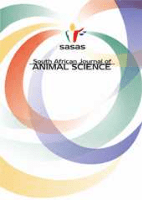
SOUTH AFRICAN JOURNAL OF ANIMAL SCIENCE
Championing scientific discovery in animal sciences.SOUTH AFRICAN JOURNAL OF ANIMAL SCIENCE is a leading scholarly publication dedicated to the dissemination of original research, review articles, and critical insights in the fields of animal science and zoology. Established in 1974, this journal is published by the South African Journal of Animal Sciences and has since become an essential resource for researchers and professionals in the field. The journal, which currently holds a Q3 ranking in Animal Science and Zoology as per Scopus rankings, aims to promote scientific knowledge and innovation in animal husbandry, welfare, nutrition, and breeding practices, with a particular emphasis on the South African context. The journal's rigorous peer-review process ensures high-quality research is shared widely among the academic community. Researchers and students alike will find valuable content and access options that support ongoing education and professional development in this vital area of study. For more information, interested readers can contact the editorial office at PO Box 13884, Hatfield 0028, South Africa.
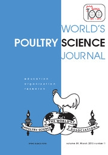
WORLDS POULTRY SCIENCE JOURNAL
Empowering researchers with cutting-edge poultry science insights.Worlds Poultry Science Journal, published by Taylor & Francis Ltd, is a premier academic journal in the field of poultry science, recognized for its significant contributions to advancements in animal science and zoology. With an impressive impact factor and a 2023 ranking placing it in the Q1 category for both Agricultural and Biological Sciences, this journal is highly regarded among researchers and professionals. As an authoritative source for innovative research from 1945 to 2024, it serves as an essential platform for the dissemination of knowledge concerning poultry health, nutrition, genetics, and management strategies. While it currently does not offer open access, the journal caters to a global audience, fostering collaboration and advancing scientific understanding within the poultry industry. Located in the United Kingdom, Worlds Poultry Science Journal is positioned at the forefront of poultry research, making it an invaluable resource for students, scholars, and industry experts alike.

Tropical Animal Science Journal
Advancing Knowledge in Tropical Animal ScienceTropical Animal Science Journal, ISSN 2615-787X, E-ISSN 2615-790X, is an esteemed open-access journal published by the Bogor Agricultural University, Faculty of Animal Science. Launched in 2018, this journal serves as a pivotal platform for disseminating high-quality research in the fields of Animal Science, Food Animals, and Veterinary Medicine. With its significant presence in Indonesia and a commitment to scientific innovation, it has achieved a Q3 ranking in Animal Science and Zoology and Food Animals, as well as a Q2 ranking in Veterinary (miscellaneous) as of 2023. The journal also enjoys favorable Scopus rankings, placing it in the 61st percentile for General Veterinary and demonstrating its relevance and impact in the academic community. As an advocate for open-access publishing since its inception, the journal enhances accessibility to critical research findings, making it an invaluable resource for researchers, professionals, and students alike who aim to advance their knowledge and contribute to the fields of tropical animal science.
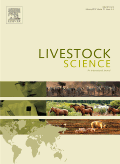
Livestock Science
Connecting Researchers to Transform Livestock HealthLivestock Science is a prestigious academic journal published by ELSEVIER, dedicated to the comprehensive study of animal science and veterinary medicine. With an esteemed Q1 ranking in both the fields of Animal Science and Zoology, as well as Veterinary (miscellaneous) in 2023, this journal is recognized for its impactful contributions to the understanding of livestock health, production, and management. The journal has consistently earned its high position within Scopus, ranking 26th out of 194 in General Veterinary and 86th out of 490 in Animal Science and Zoology, reflecting its significant influence within the research community. The open access policy allows for broader dissemination of knowledge, promoting collaboration among researchers, professionals, and students alike. With its continuous publication cycle from 2006 to 2024, Livestock Science remains an essential resource for anyone interested in the advancements, challenges, and innovations within the field of livestock management and veterinary practices.
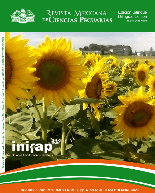
Revista Mexicana de Ciencias Pecuarias
Exploring New Frontiers in Animal Science and WelfareRevista Mexicana de Ciencias Pecuarias, published by INIFAP-CENID PARASITOLOGIA VETERINARIA, is a prominent open-access journal since 2010 that caters to the fields of Animal Science and Veterinary Medicine. Based in Mexico, this journal addresses critical issues in animal health, production, and welfare, making it instrumental for researchers, professionals, and students seeking to advance their knowledge and practices. With an impact factor that reflects its growing influence, particularly in the Q3 quartile rankings in both Animal Science and Zoology as well as Veterinary (Miscellaneous) categories, the journal provides a vital platform for the dissemination of innovative research and findings. Additionally, its Scopus Ranks position highlights its role in publishing significant contributions to the fields of Veterinary Science and Agricultural Biology. The journal fosters a collaborative learning environment through its open-access model, ensuring that valuable insights are accessible to a wide audience. For those committed to enhancing animal well-being and advancing veterinary practices, the Revista Mexicana de Ciencias Pecuarias stands as a key resource through its rigorous peer-reviewed publication process and commitment to scientific excellence.
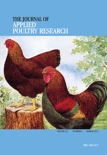
JOURNAL OF APPLIED POULTRY RESEARCH
Championing open access to vital poultry research.The Journal of Applied Poultry Research, published by Elsevier, stands as a pivotal resource in the field of poultry science. Established in 1992, this esteemed journal has transitioned to an Open Access model since 2020, fostering broader dissemination and accessibility of research findings. With an ISSN of 1056-6171 and an E-ISSN of 1537-0437, it is indexed in prominent databases, achieving a commendable Q2 ranking in the Animal Science and Zoology category as of 2023, placing it in the top 20% of journals in its field (Rank #91 out of 490, 81st percentile). The journal aims to advance the science and practice of poultry research, covering areas such as nutrition, genetics, management, and welfare. With editorial oversight that ensures rigorous peer review, the Journal of Applied Poultry Research is a vital platform that supports researchers, professionals, and students dedicated to enhancing poultry production and sustainability. Its commitment to high-quality research makes it an essential read for anyone involved in poultry science, agriculture, and related disciplines.

Brazilian Journal of Poultry Science
Unlocking the potential of poultry through open access.Brazilian Journal of Poultry Science, an esteemed publication of FACTA-FUNDACIO ARNCO CIENCIA TECNOLOGIA AVICOLAS, serves as a pivotal resource for researchers and professionals in the field of poultry science. Since its inception in 2000, the journal has maintained a commitment to Open Access, ensuring that high-quality research is accessible to a global audience. Based in Brazil, the journal provides a platform for innovative studies and advancements in animal science and zoology, achieving a commendable Q3 category ranking in 2023 and occupying the 270th position in Agricultural and Biological Sciences according to Scopus metrics. With a focus on disseminating robust scientific findings, the journal enhances understanding of poultry production, welfare, and genetics, crucial for the increasingly essential food production sector. Published continuously from 2002 to 2024, it remains dedicated to fostering knowledge exchange, supporting academic growth, and addressing the challenges faced by the poultry industry.
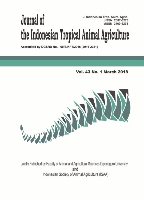
Journal of the Indonesian Tropical Animal Agriculture
Pioneering Research for Tropical Animal AgricultureJournal of the Indonesian Tropical Animal Agriculture is an esteemed peer-reviewed journal published by UNIV DIPONEGORO, focusing on the dynamic fields of animal science and veterinary medicine. Since its inception in 2009, the journal has maintained an open access policy, ensuring that valuable research is freely available to the global scientific community. Based in Indonesia, the journal has adapted to the evolving agricultural landscape and now contributes significantly to both local and international discourse on tropical animal husbandry. With a Scopus rank placing it within the 36th percentile for general veterinary sciences and the 25th percentile for animal science and zoology, it is emerging as a valuable resource for researchers and professionals alike. The journal covers a broad range of topics within its scope, fostering innovative approaches and solutions tailored to the unique challenges of the tropical environment. By exploring critical issues in animal agriculture, this journal not only enhances academic knowledge but also supports sustainable practices within the industry. We invite researchers, students, and professionals in the realm of veterinary science and animal agriculture to engage with the rich array of research presented in this journal.
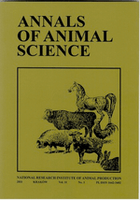
Annals of Animal Science
Advancing Knowledge in Animal ScienceAnnals of Animal Science is a prestigious academic journal, published by Walter de Gruyter GmbH in Germany, specializing in the multifaceted field of Animal Science. With an ISSN of 1642-3402 and an E-ISSN of 2300-8733, this journal is recognized for its high-impact contributions, holding a commendable impact factor that demonstrates its relevance in nurturing quality research. The journal has garnered Q2 rankings in 2023 across various categories including Animal Science and Zoology, Food Animals, and Small Animals. Notably, its Scopus Rankings indicate an elite standing, with the journal placing in the top 10% within its specific fields. Covering converged years from 2008 to 2024, the Annals of Animal Science serves as an essential platform for researchers, professionals, and students to disseminate knowledge and advance studies related to animal health, welfare, and production. The journal also emphasizes open access, promoting broader accessibility to foster collaboration and innovation in Animal Science globally. For those committed to advancing their understanding of veterinary and agricultural sciences, this journal is a vital resource.